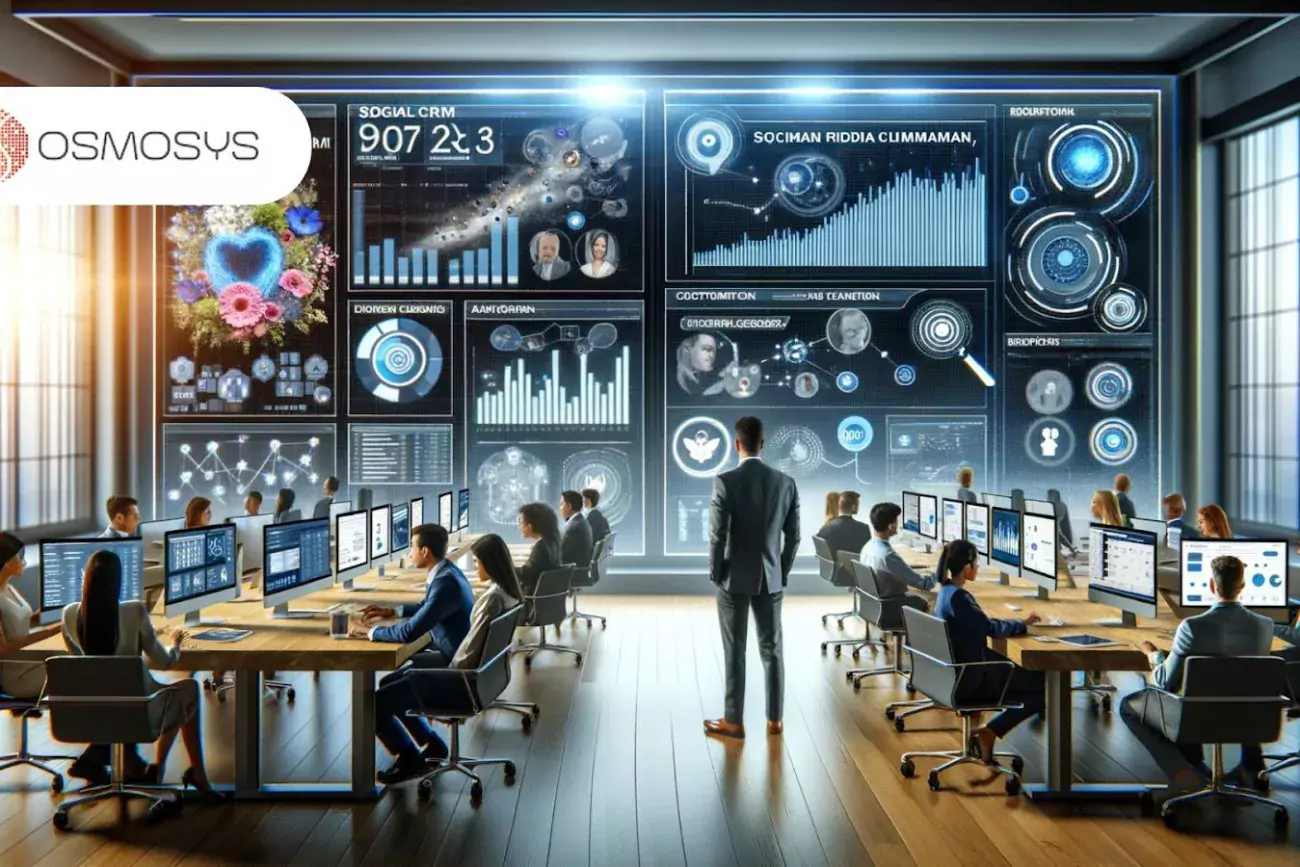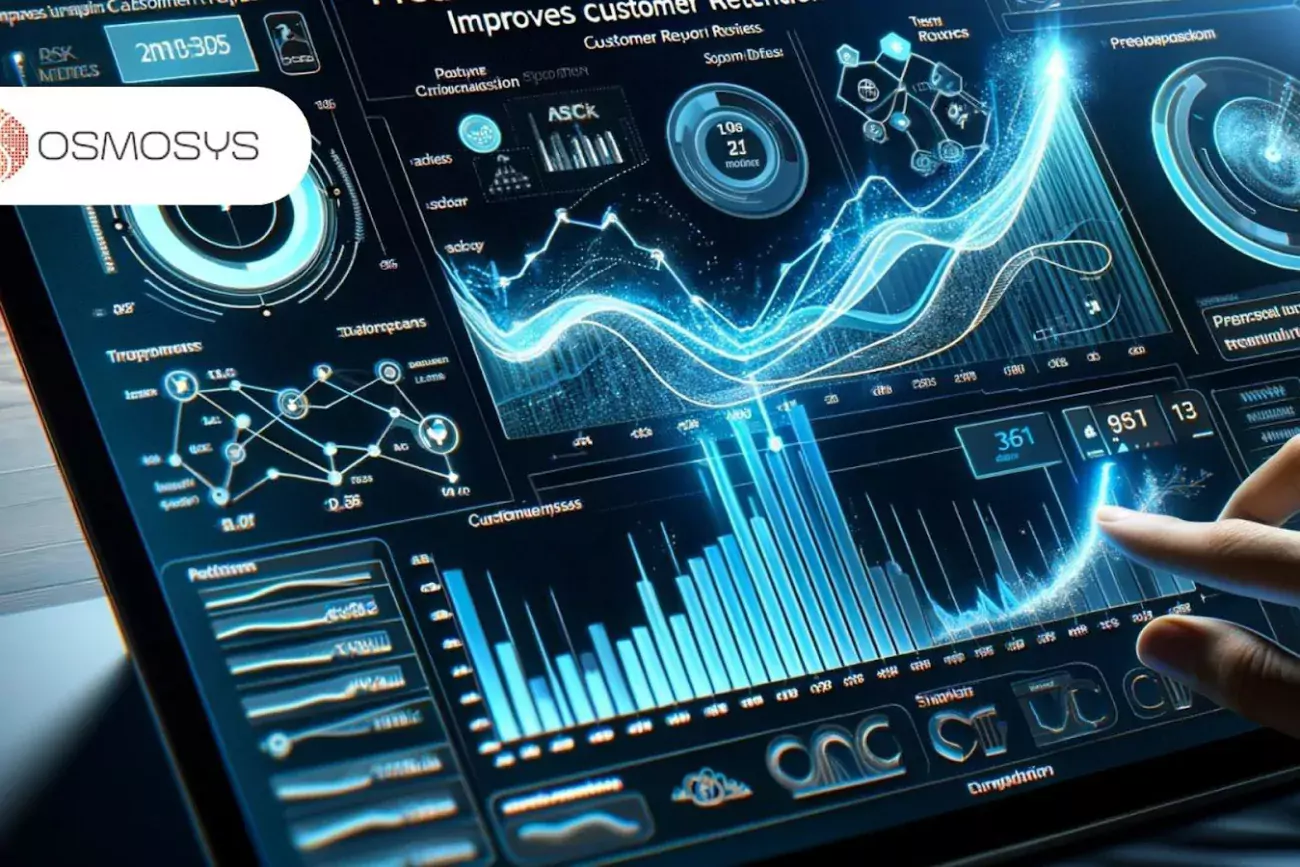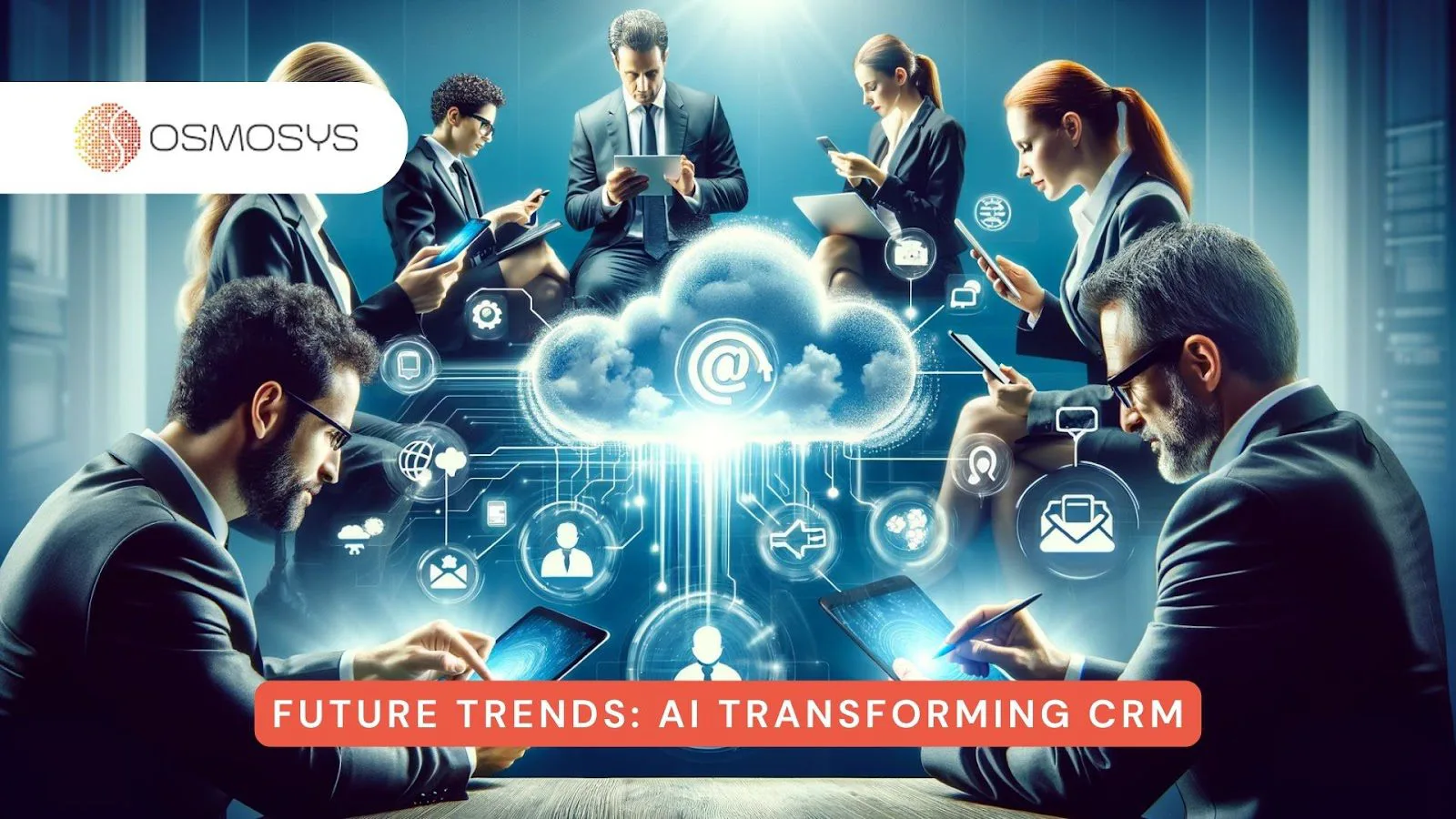Imagine a world where understanding each customer’s unique needs and preferences isn’t just a dream but a daily reality for businesses. As dawn breaks in 2024, this world is not a figment of imagination but a tangible reality, thanks to the revolutionary impact of Artificial Intelligence (AI) in Customer Relationship Management (CRM).
Let us take you on a journey back to just a few years ago. Businesses, large and small, grappled with the challenge of deciphering vast amounts of customer data. They struggled to personalise experiences, often missing the mark in understanding what their customers truly desired. Customer interactions were based more on guesswork and less on informed insights, leading to missed opportunities and unfulfilled potential.
Fast forward to 2023, and the landscape has dramatically transformed. AI has emerged as the guiding star in the CRM universe. It’s not just about storing customer information anymore; it’s about intelligently analysing this data to glean insights that were once hidden in plain sight. AI in CRM has become the key to unlocking a new realm of personalised customer experiences, efficient service, and strategic business growth.
In this blog, we’ll explore how AI is reshaping the world of CRM. We’ll delve into the future trends that are not just changing the way businesses interact with customers but also redefining the very essence of customer relationships. From hyper-personalisation to predictive analytics, voice technology to ethical AI, we’ll uncover the facets of this transformative journey.
Table of Contents
Hyper-Personalisation in CRM
Gone are the days of generic marketing blasts and one-size-fits-all customer communications. As we step into 2024, CRM is not just about managing relationships; it’s about deeply understanding and catering to each individual customer. This is where hyper-personalisation, powered by AI in CRM, takes centre stage.

The Evolution of Personalisation
In the past, businesses grouped customers into broad segments based on basic data like age, location, or purchase history. Personalisation meant addressing a customer by name in an email or offering generic discounts. However, these methods lacked depth and personal relevance, often failing to resonate on a deeper, individual level.
Now, AI is transforming this landscape. Hyper-personalisation involves leveraging AI in CRM algorithms to analyse an array of customer data points – from browsing habits and purchase history to social media interactions and even weather patterns impacting customer behaviour. This deep dive into data enables businesses to craft highly individualised experiences, offers, and communications that resonate personally with each customer.
Real-World Impact of Hyper-Personalisation
Imagine a scenario where a fitness apparel store, ‘ActiveWear’, uses AI to personalise its customer interactions. The AI system at ActiveWear doesn’t just recommend a generic set of workout clothes; it suggests items based on the customer’s recent workout activity, preferred exercise type, and past purchase patterns. For a yoga enthusiast, it might recommend a new range of eco-friendly yoga mats; for a marathon runner, the latest endurance-enhancing running shoes.
This level of personalisation makes the customer feel understood and valued, significantly enhancing their engagement with the brand. It’s no longer about selling a product; it’s about providing a solution that fits perfectly into the customer’s lifestyle.
The Business Value of Hyper-Personalisation
The benefits of hyper-personalisation extend far beyond customer satisfaction. For businesses, it’s a game-changer in AI in CRM, as in several ways:
- Increased Customer Loyalty: Personalised experiences foster a deeper emotional connection with customers, leading to increased brand loyalty.
- Higher Conversion Rates: Relevant and timely offers have a higher likelihood of converting prospects into customers.
- Enhanced Customer Insights: The more a business personalises, the more data it gathers, leading to even more refined customer insights and strategies.
Navigating the Challenges of AI in CRM
The vast amount of data required for such detailed personalisation raises concerns about data privacy and security. Businesses must navigate these challenges with a strong commitment to ethical data practices, ensuring customer trust is never compromised.
As we look towards the future of AI in CRM in 2024, hyper-personalisation stands as a pillar of innovation, driving deeper customer connections and business growth. It’s not just a trend; it’s the new standard in customer relationship management, one that demands attention and strategic implementation.
Expert Insights on AI-Driven Automation
AI-driven automation in CRM is streamlining workflows like never before. From predictive lead scoring to automated customer service interactions, AI is enhancing efficiency and decision-making accuracy.

Jane Doe, a renowned AI expert, highlights that “AI-driven CRM tools are not just automating tasks; they are transforming how businesses understand and interact with their customers.”
AI in CRM: Voice Technology
The integration of voice technology into Customer Relationship Management (CRM) systems is not just a futuristic concept—it’s a reality that’s going to reshape the CRM landscape in 2024. This innovative feature is enhancing the way businesses interact with their AI in CRM systems, making them more intuitive, efficient, and user-friendly.
The Rise of Voice-Activated CRM
The emergence of voice technology in CRM is a response to the increasing demand for more efficient and hands-free ways of managing customer engagements. According to insights gathered from Response Labs, voice technology is no longer confined to smart speakers and virtual assistants. In 2024, it’s going to be increasingly integrated into CRM systems, allowing users to perform a range of functions through simple voice commands.
Transforming User Interactions and Efficiency
Voice-activated commands in CRM are simplifying tasks such as accessing data, generating reports, and executing actions. This ease of use is not just about convenience; it’s about transforming the efficiency with which CRM tasks are performed. Voice technology enables quick access to information, streamlines data entry, and enhances the overall user experience.
Real-World Applications of AI in CRM in Businesses
Imagine a sales representative preparing for a meeting while on the go. Instead of stopping to type out a query, they can simply use voice commands to retrieve the latest information on a client from the CRM system. This capability not only saves time but also ensures that the sales representative is always equipped with the most current data.
The Future of Voice Technology in CRM
As we look towards the future, voice technology in CRM is expected to evolve further, becoming more sophisticated and integrated into various aspects of CRM. This includes not only basic command and control functions but also more complex interactions such as voice-based analytics and predictive insights.
Embracing the Voice Technology Trend
For businesses, adapting to this trend involves more than just upgrading technology—it requires a shift in how CRM is perceived and utilised. Training and development will be key in helping teams maximise the potential of voice technology in CRM, ensuring that they are equipped to use this tool effectively.
AI in CRM: The Evolution of Social CRM

One of the most striking advancements in the AI in CRM sphere is going to be the evolution of Social CRM. This progression is not merely an upgrade but a significant shift in how businesses interact with customers and utilise social media data.
The Integration of Social Media and CRM
Social CRM represents the convergence of social media capabilities with traditional CRM functionalities. As highlighted by experts, this integration is going to transform the way businesses monitor, respond to, and engage with customers on social media platforms.
Enhancing Customer Insights with Social Data
The core of Social CRM lies in its ability to provide a more comprehensive view of the customer. By integrating social data into CRM systems, businesses can understand customer preferences, behaviours, and sentiments more holistically. This integration enables more targeted marketing campaigns and helps businesses build meaningful connections with their audience.
Real-World Applications of AI in CRM
Consider a scenario where a business uses Social CRM to track customer feedback on social media. Instead of simply monitoring and responding to these comments, the CRM system analyses the data to identify trends and patterns. This could lead to the development of new products or services that align more closely with customer needs, or to the refinement of marketing strategies to better resonate with the target audience.
The Future of Social CRM
Looking forward, the evolution of Social CRM is expected to continue, with a focus on even more seamless integration and real-time data processing. The potential for predictive analytics within Social CRM is vast, offering businesses the opportunity to not just react to customer behaviours but to anticipate them.
Adapting to the Social CRM Trend
For businesses, adapting to this trend involves a strategic approach to integrating social media data into their CRM systems. This requires not only the right technology but also a culture that values social media as a key component of customer relationship management.
Customised Industry-Specific CRM Solutions

Another key trend in Customer Relationship Management (CRM) is going to be the rise of customised, industry-specific solutions. This shift represents a move away from one-size-fits-all CRM systems to more tailored approaches that address the unique needs and challenges of different industries.
Tailoring CRM to Industry Needs
The move towards industry-specific CRM solutions stems from the recognition that businesses in different sectors have distinct requirements. For instance, a healthcare provider’s CRM needs differ significantly from those of a retail business. Customised CRM solutions cater to these unique requirements, offering functionalities and integrations specific to each industry.
Real-World Benefits of Customised CRMs
Customised CRM solutions provide several tangible benefits:
- Enhanced Relevance: They offer features and tools that are directly relevant to the specific operational needs and customer management strategies of an industry.
- Improved Efficiency: By aligning with industry workflows, these CRM systems enable businesses to operate more efficiently and effectively.
- Deeper Insights: Tailored CRM solutions can provide more accurate and relevant data insights, aiding in better decision-making.
Industry-Specific CRM in Action
An example of this trend can be seen in the retail industry, where CRM systems are now equipped with tools for inventory management, customer loyalty tracking, and e-commerce integration. Similarly, in healthcare, CRMs are evolving to include patient management systems, appointment scheduling, and compliance with health data privacy regulations.
The Future of Industry-Specific CRMs
Looking ahead, the demand for customised CRM solutions is expected to grow as businesses seek to gain a competitive edge through technology that’s closely aligned with their industry’s needs. This will likely lead to a proliferation of niche CRM providers specialising in specific sectors, offering more advanced and fine-tuned functionalities.
Adapting to the Customised CRM Trend
For businesses, adapting to this trend means evaluating their specific industry needs and choosing a CRM solution that aligns closely with these requirements. It also involves training staff to effectively utilise these specialised tools to maximise their benefits.
Preparing for the Future of AI in CRM: Skills and Training in CRM

As we journey into the future of CRM, dominated by AI and specialised software, one critical aspect that businesses need to focus on is the skills and training required to navigate this evolving landscape effectively. The integration of advanced technologies into CRM systems demands a workforce that is not only tech-savvy but also adaptable to continuous learning and development.
The Necessity of Upskilling
In the world of AI in CRM systems, traditional CRM skills are no longer sufficient. The workforce needs to be upskilled to understand and leverage AI functionalities effectively. This includes training in data analysis, understanding AI-driven insights, and managing automated CRM systems.
Key Areas of Focus for Training
- Data Analytics and Interpretation: As CRM systems become more data-centric, proficiency in data analytics is crucial. Employees need to understand how to interpret data insights and use this knowledge to enhance customer relationship strategies.
- AI and Machine Learning: Understanding the basics of AI and machine learning is essential. This knowledge will help employees to better interact with AI-driven CRM tools and leverage their capabilities to improve customer experiences.
- Adaptability to New Technologies: With the rapid evolution of CRM technologies, adaptability is key. Continuous learning and staying abreast of the latest CRM trends and tools will be crucial for businesses.
- Soft Skills: Alongside technical skills, soft skills like critical thinking, problem-solving, and effective communication are increasingly important. These skills are essential for interpreting data insights and making informed decisions.
Preparing for the future in CRM is not just about adopting the latest technologies; it’s also about investing in the skills and training of the workforce. By focusing on upskilling and continuous learning, businesses can ensure they are well-equipped to leverage the full potential of advanced CRM systems and maintain a competitive edge in the market.
The integration of AI in CRM is revolutionising customer data management and engagement. AI algorithms offer the ability to automate repetitive tasks and analyse vast amounts of data, providing businesses with valuable insights for personalised marketing and sales efforts. This transformation extends to sales forecasting, lead generation, and customer support, where AI can significantly enhance efficiency and accuracy.
Conclusion
To conclude, it’s evident that the integration of Artificial Intelligence (AI) is not just a trend but a fundamental shift in how businesses will manage and nurture customer relationships. The journey through various aspects of AI in CRM, from hyper-personalisation and voice technology to industry-specific solutions, highlights a landscape brimming with innovation and potential.
As we move forward, the synergy between AI and CRM is set to deepen, offering unprecedented opportunities for businesses to enhance their customer relationship strategies. For organisations looking to stay ahead in this dynamic environment, consulting with CRM experts can be a pivotal step.
To help businesses navigate this AI-driven CRM landscape, we are offering a free AI check-up for your CRM systems. This check-up will provide you with insights into how AI can enhance your current CRM strategies and what you can do to integrate these technologies seamlessly into your business operations. Book your check-up here.


